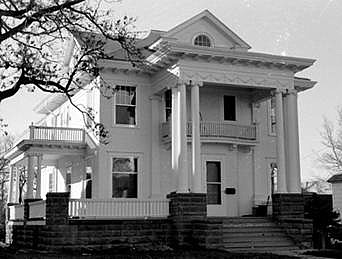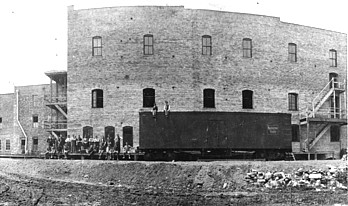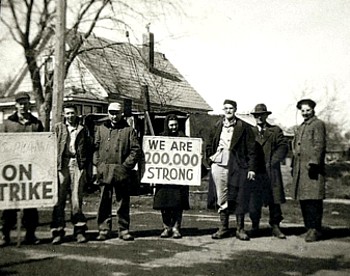


Cerro Gordo County Iowa
Part of the IaGenWeb Project
|
Mason City, Cerro Gordo County, Iowa In 1896-97, John T. RICHARDS (1837-1903) built a meat packing plant along the Winnebago River in the northern portion of Mason City. Jacob E. DECKER and his son Jay began renting the RICHARDS plant on July 4th of 1899. Jacob and Jay DECKER purchased the RICHARDS plant for $6,000 in 1901 and established the Jacob E. DECKER & Sons Meat Packing Company. This plant provided a thriving business for the DECKERS and greatly boosted Mason City's economy. At one tme, the plant employed 1,3000 people.
The business community of Cerro Gordo county as a valued acquisition in the person of Jacob E. DECKER, who is the executive head of the well known corporation of Jacob E. DECKER & Sons. This corporation succeeded to the business of the Mason City Packing Company, of which John T. RICHARDS was president and which initiated the business about the year 1897, when operations were instituted upon a modest scale. The present plant was largely erected and equipped by the present owners, who have found it necessary to augment the facilities from time to time to meet the constantly increasing demands placed upon the establishment. The plant now has a capacity for the handling of one thousand hogs daily, besides about fifty head of cattle and a relative number of sheep and calves. The firm represents one of the most important industrial enterprises in Cerro Gordo county and it affords employment to an average of more than one hundred men in addition to the regular office force and corps of traveling representatives, of which latter the number is usually about twelve. Branch houses are maintained in Minneapolis and Duluth, Minnesota. In the earlier stages of the business its functions were confined to the slaughtering and handling of hogs only, but with the development of the facilities for the handling of cattle, sheep and calves, the enterprise has inured greatly to the benefit of the stock growers of this section, as well as to those engaged in the retail meat trade. All of the buildings of the plant, as at present constructed, were erected by Jacob E. DECKER and they afford an aggregate floor space of nearly 100,000 square feet. The corporation is absolutely independent in its operations and its products are sold directly to retailers in Iowa, Minnesota, Wisconsin, North and South Dakota and Montana, besides which carload shipments are made to nearly all of the large cities in the United States, with especially large trade in Texas. The export business of the corporation is likewise expanding in scope. The company manufactures the celebrated Elk brand of ham and bacon. The officials of this important concern are as here noted: Jacob E. DECKER, president; Jay E. DECKER, vice-president; Ralph W. E. DECKER, secretary and treasurer; Edmund R. DUNLOP, sales manager. Jacob E. DECKER, president of the corporation of Jacob E. DECKER & Sons, was born at Neuweid Prussia, on the 1st of April, 1849, and in 1852 he came with his parents on their removed to America. He is a son of Louis and Ann (BOECKING) DECKER, the former of whom died in the city of Chicago, in 1899, at the patriarchal age of ninety-four years, and the latter of whom died at Buffalo, New York, when sixty-two years of age. After coming to America, Louis DECKER established his home in the city of Buffalo, New York, where he engaged in the pork-packing and butchering business, in which he there continued until his final retirement from active labor. The enterprise which he established so many years ago is still continued by his son Albert. Jacob E. DECKER gained his early education in the public schools in the city of Buffalo, but he early assumed practical responsibilities, as he began to serve as a driver on the towpath of the Erie canal when but twelve years of age. Shortly afterward he ran away from home and began sailing on the Great Lakes, while later he followed sea-faring life on the ocean for a time. During the season of closed navigation of the Lakes, he worked in packing houses and in the connection he recalled with no slight pleasure the fact that when he was thus employed by the Swift & Company of Chicago, they did not handle to exceed two carloads of cattle a day and that he was with the Armour Company when that great concern considered the butchering of four hundred and eighty head of cattle in a single day a large output. Mr. DECKER continued to sail on the Great Lakes during the summer seasons for a period of seventeen years and through his identification with the packing houses in the winter seasons he obtained a thorough knowledge of all the details of the business. In 1873 he initiated independent operation as a provision dealer in Chicago. He also began the slaughter of hogs and increased the scope of his operation as his capital justified. It should be recalled that he was superintendent of a packing house before he had attained his legal majority and in view of his occupation it is also interesting to recall that his ancestors on the maternal side largely followed the sea-faring life and that his father's family were long identified with the butchering and general meat business in Prussia. Mr. DECKER developed his plant in Chicago until it had a capacity for handling five hundred hogs and one hundred head of cattle daily. He disposed of his interests in the business in 1897 and two years later he came to Mason City, Iowa, to establish a packing plant and thereby provide a business opportunity for his sons. The outcome of this plan is shown in the extensive and important business controlled by the corporation of which he is president. In 1907, at a convention of the organization held in the city of Chicago, Mr. DECKER was made an honorary member of the American Meat Packers Association. He is a staunch Republican in politics, has served as a member of the city council in Mason City from 1901 to 1905 inclusive, and in the office of water commissioner he gave the most effective service in rehabilitating the local water system. He is essentially liberal and public spirited in his attitude and is held in unqualified esteem in the city that now represents his home. He is affiliated with the Masonic fraternity, including the commandery in the city of Chicago, where he also holds membership in the Ancient Arabic Order of the Mystic Shrine. He is also identified with the Benevolent and Protective Order of Elks and the Royal League. His wife and daughters are members of the order of the Eastern Star and his sons and son-in-law are all identified with the Masonic fraternity. Mrs. DECKER and her daughters are members of the Methodist Episcopal church. In the city of Chicago, on the 24th of September, 1873, Mr. DECKER was united in marriage to Miss Augusta SCHRAM, of Milwaukee, Wisconsin. They have two sons and two daughters. The two sons are officers of the corporation of the Jacob DECKER & Sons, as already noted; Maude L. is the wife of Edmund R. DUNLOP, sales manager of the company, and Miss Gertrude is a cultured musician and conservatory graduate and is now an instructor of voice culture and music at the Normal School at Natchitoches, Louisiana. Transcriber's Note: Jacob E. DECKER served as one of the officers of Dodge's Point and Park Company of Clear Lake. He built a cottage on Dodge's Point.
 E. R. BOGARDUS (1850-1927) came to Mason City as a child. A self-taught architect and contractor, he designed and built many of Mason City's notable buildings including a Neo-classical Mason City home for I. W. KEERL in 1894, located at 199 2nd Street SE. The home was later purchased by Jacob E. DECKER. The home was later purchased (2002) by the Mason City Foundation and was renovated for over one million dollars as a bed and breakfast, which continues to be a popular getaway today. The property was listed on the National Register of Historic Places in 2002.
 With the arrival of the Minneapolis & St. Louis Railway (MStL), the DECKER Packing Plant became one of the railroad's largest meat producer shippers. In 1955, the plant shipped 5,478 carloads, approximately 90% of the animal products shipped that year. Hogs and cattle were slaughtered and processed into meat products and meat by-products. The plant quit processing sheep around 1950. During a normal day, 5000-6000 hogs (600 an hour) and 300 cattle were processed. In addition to livestock many other products were required for operations. Salt, sawdust, sugar, coal, cardboard, soda ash and ammonia were also shipped in by rail. Most inbound commodities especially tin cans were billed to Emery IA headquarters of the Mason City & Clear Lake Railway (MC&CL). These loads were delivered directly to Deckers by the MStL. The MC&CL would get the line haul charges, while the MStL only collected a switching fee. The plant had it's own power plant which produced steam, electrical power, compressed air and pressurized ammonia. There was also an ice plant. Chunk ice was made for icing refrigerator cars and crushed ice was made for plant operations. At the "car line" hot water was used to clean reefers, steam was used to clean the tank cars. Tank cars were loaded with lard, tallow, white grease and "stick" (evaporated tank water). Other products shipped included Fresh pork, cured pork, smoked meats, bacon, canned hams, beef quarters, bone meal, tankage, dried hog hair and beef hides. A Milwaukee Road waybill showed a car load of canned pork was routed MStL Mason City, Iowa, to Minneapolis MN, then Milwaukee Washington Railroad to Seattle, Washington. In 1929, Adolf GOBEL, Inc. acquired over 96% of the common stock of the Jacob E. DECKER & Sons plant in Mason City. At the time, the DECKER plant had branches throughout the Midwest and revenues of $16 million. Adolf GOBEL, founder of Adolf GOBEL, Inc., was a peddler in 1891 New York City who sold his delicatessens products to small butcher shops from a wicker basket he carried with him. Orignally, GOBEL intended to sell sausages, but demand caused him to add other delicatessen products. With a growing demand for his delicatessen goods increased, GOBEL opened a store in the Williamsburg district of Brooklyn. The business grew and expanded to many sections of New York City. GOBEL'S products included a wide variety of fresh and smoked meat. By 1926, the company had 96 motorized trucks and employed 450 people. Adolf died in 1926. His heirs sold most of the company to a group of bankers and a small portion of common stock was sold publicly.The Adolf GOBEL, Inc. was incorporated in New York during August of 1926. Adolf GOBEL, Inc. sold a record of 243,715,995 pounds of meat in 1930.
The New York Times
Decker & Sons of Mason City, Iowa, Absorbed by Chicago Concern. CHICAGO, Aug. 21. -- Armour Co. has contracted to purchase the properties of Jacob E. Decker Sons, including the meat-packing plant at Mason City, Iowa, and several branch houses, it was announced today by R.H. CABELL, president of Armour Co. Armour purchased the DECKER plant in October of 1935 for $4.972 million, operating it as DECKER Packing Plant until its closure in 1975. The plant, located between Federal Avenue and the Winnebago River north of 14th Street was torn down in the 1970's. The Iowa Heartland Credit Union was formed in 1932 as the DECKER & Sons Credit Union. The DECKER Meat Packing Plant was the sole sponsor. Although DECKER and Sons sold to Armour in 1936, the credit union continued as DECKERS until the mid-1970's. For a shor time, it operated as Armour Employees Credit Union until the Armour plant shut down.
 Strike on the Jacob E. Decker & Sons Plant, Mason City, 1948 In 1937, The Packing House Workers of America organized as the United Packing House Workers Local Industrial Union. Other chapters of the meat packers union were founded in Davenport, Waterloo, Fort Dodge, Cedar Rapids, and Des Moines. At the end of World War II, employers generally tested the labor unions, seeing if they could roll back the unions as they had accomplished after the First World War. The response was a massive strike wave which succeeded in maintaining the unions and won substantial gains for union membership. In 1948, the packers once again tested the unions, oiffering a token wage increase which had been recommended by a governmental fact-finding board. On March 16th of 1948, United States meat production was halved when 100,000 C.I.O. [Congress of Industrial Organization] workers went on strike in 140 packing houses in support of a demand for third-round wage increases. The situation in Minnesota got so ugly that the national guard was called out and tanks patroled the streets of South St. Paul. After a 10-week strike, the packers were unable to break the union and the C.I.O. workers gave into the original terms that the American Federation of Labor [AF of L] had settled for. Consequently, beginning in the 1950's, packers started dismantling traditional packing centers located in Chicago, St. Louis, Kanss City and St. Paul. Armour Food Company, owned by Greyhound Corporation, reopened the plant at 1401 S. Eisenhower Avenue, Mason City, in 1978. In 1979, Walter LAURIDSEN opened a family-owned meat packing plant, LAURIDSEN Foods, in Britt, where they processed hams and delicatessen ham products, mostly for Armour Food Company. In 1983, Greyhound Corp. sold Armour Food Company to ConAgra Foods. ConAgra Foods purchases LAURIDSEN Foods in 1989. The following year, ConAgra acquired Beatrice Foods Company which created the absorbion of National Foods which produced kosher Hebrew National lunch meat products. The plant was honored December 9th of 2002 by the Iowa Department of Economic Development as one of Iowa Century Buiness. These businesses were founded in or before 1902 and had been in continuious operation since that time. When ConAgra's Britt plant operation was consolidated with the Mason City facilities in 2004, a 50,000 square-foot ham processing unit was constructed. ConAgra Foods announced in 2006 that it will sell most of its refrigerated meat businesses which includes the Mason City plant.
The Globe Gazette
 MASON CITY — ConAgra Foods Inc. will sell most of its refrigerated meat businesses, including the Mason City plant which employs about 280 people. The Omaha, Neb.-based company hopes to make the sale within the year in order to streamline its operating structure, spokeswoman Tania GRAVES said Friday. The Mason City plant will operate until it is sold, she said. It is hoped the buyer would continue to operate the facility as a meat-packing plant. ConAgra processes ham, hot dogs and semi-dry sausage packaged under the Armour, Eckrich and Healthy Choice brands in the plant at 1401 S. Eisenhower Ave. "It is business as usual for us," GRAVES said. "We're going to continue to do our best to operate these businesses effectively and efficiently, up until the sale. "It's hard to tell precisely when a business transaction would be complete," she added. "We hope it would happen within the calendar year." ConAgra has reported declining profits in five of the past six quarters. Its businesses being sold have combined annual sales of about $1.9 billion. They include Armour meats and hot dogs, Butterball turkey, and Eckrich smoked sausages, hot dogs and lunch meats. The Healthy Choice meats are not included in the assets for sale. Smithfield Foods Inc., based in Smithfield, Va., agreed last week "to acquire substantially all of the assets" of Cook's, a ham processing business owned by ConAgra. ConAgra closed its operation in Britt during 2004 and consolidated with the Mason City plant. A 50,000 square-foot ham processing unit was added that year. The plant has a total of about 195,000 square feet. BRITT IA — Prospective buyers continue to look at the former ConAgra Foods plant in Britt, according to Cindy SCHACK, director of the Hancock County Economic Development Corp. The plant has been for sale since 2004. In June 2004, officials announced that the Britt plant, which employed 110, would close by October 2004. Production was moved to the Mason City plant. SCHACK said the plant is listed with a real estate agent, on the development corporation's Web site and on LocationOne, an online economic development database that provides information on buildings, sites and locations for businesses looking to expand. The 86,000-square-foot Britt ConAgra plant was built in 1979. The asking price is $2.5 million.
SOURCES:
|
Return to Cerro Gordo's History Index Page
Return to Cerro Gordo Home Page